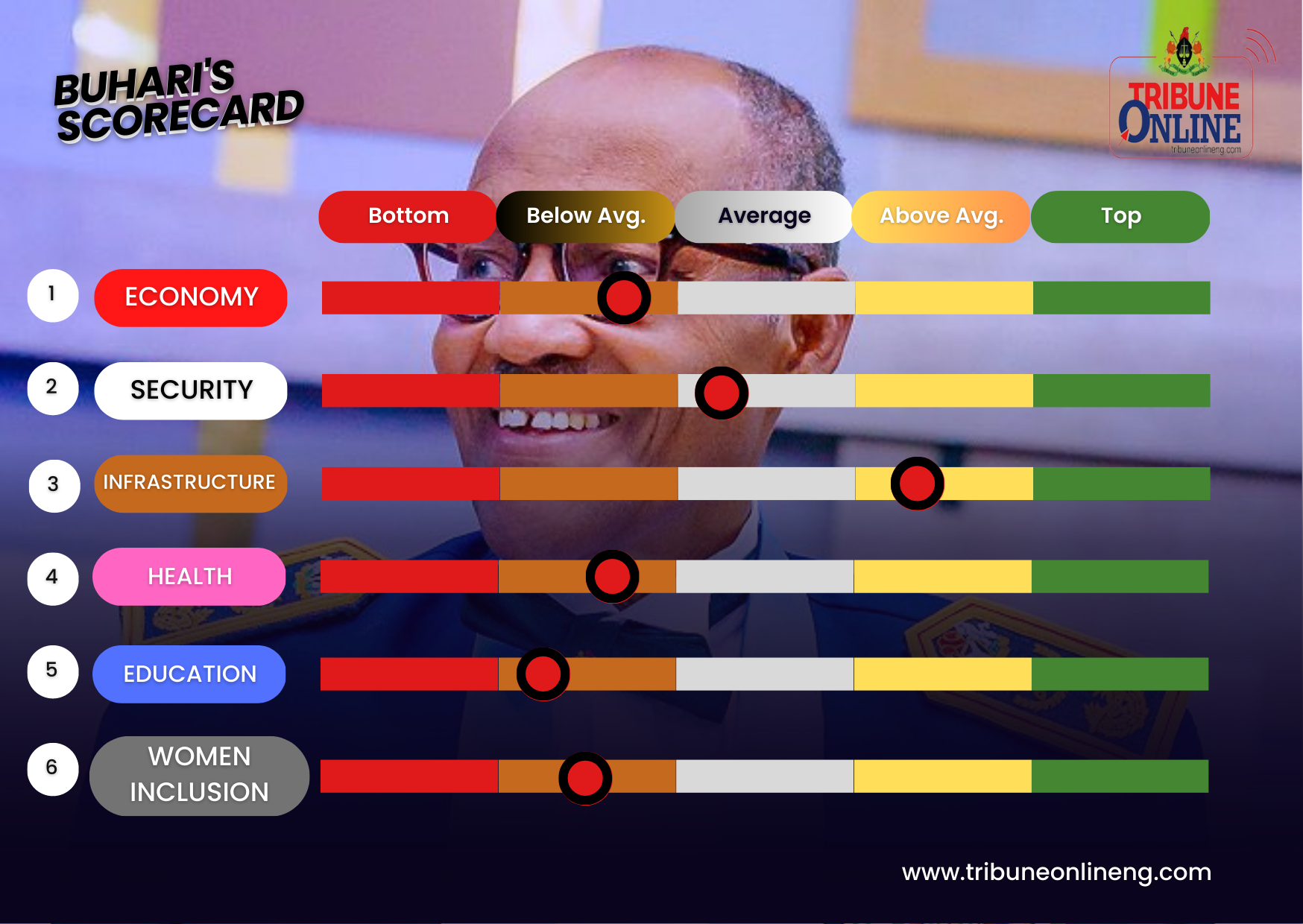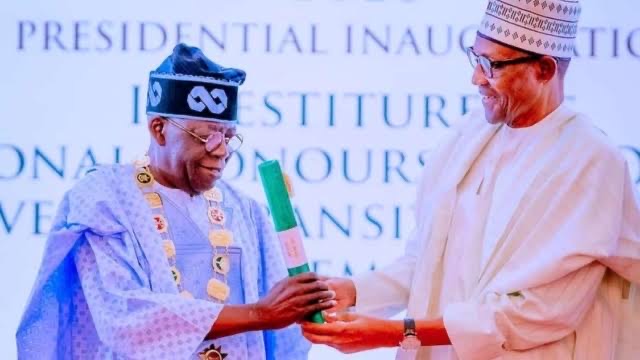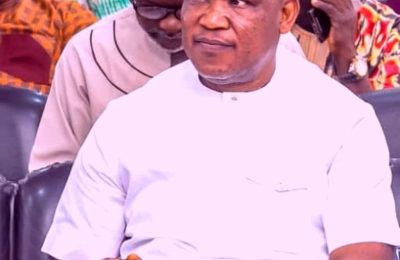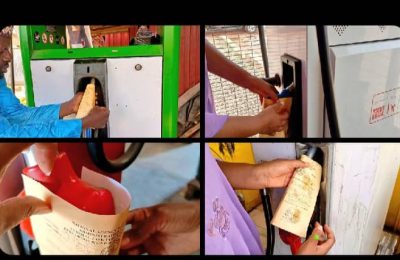

As preparations continue in top gear for Nigeria to inaugurate its 16th President on May 29, in this piece, TRIBUNE ONLINE looks into the eight years of outgoing President Muhammadu Buhari — in terms of Economy, Infrastructure, Security and Education — in a bid to set agenda for the incoming administration of President-elect, Bola Ahmed Tinubu.
Eight years of Buhari and Nigeria’s economy
It’s become common knowledge that 40.1 per cent of Nigerians — over 80 million people— live on less than the national poverty line of N137,430 per person per year. According to the United Nations, poverty entails more than the lack of income and productive resources, but includes hunger and malnutrition; limited access to education and other basic services; social discrimination and exclusion, as well as the lack of participation in decision-making.
That 84.1 per cent of poor Nigerians lived in rural areas is one of many markers of Nigeria’s spatial inequality.

In a report published by the World Bank, sluggish growth, low human capital, labour market weaknesses, and exposure to shocks are holding Nigeria’s poverty reduction back.
Away from poverty, growth in Gross Domestic Product (GDP); inflation, import and export statistics, exchange rate (Forex index) are indicators to determine gains or otherwise of Buhari’s economic performances. However, all these practically impact poverty reduction — and on the other hand, how more ordinary Nigerians fall drastically below the poverty line.
To start with, President Muhammadu Buhari took over a GDP of $486.80 billion (USD) in 2015. As at 2021, Nigeria’s GDP was $436.29 billion (USD) while its growth fell to 3.1 per cent in 2022, compared to 2021, according to the National Bureau of Statistics (NBS).

Also, Nigeria’s inflation rate was 9.01% in 2015 when President Muhammadu Buhari assumed office. According to the National Bureau of Statistics (NBS) report, the country’s inflation rate skyrocketed in the first quarter of transition year and hit 22.22% in April — fourth consecutive increase in 2023.
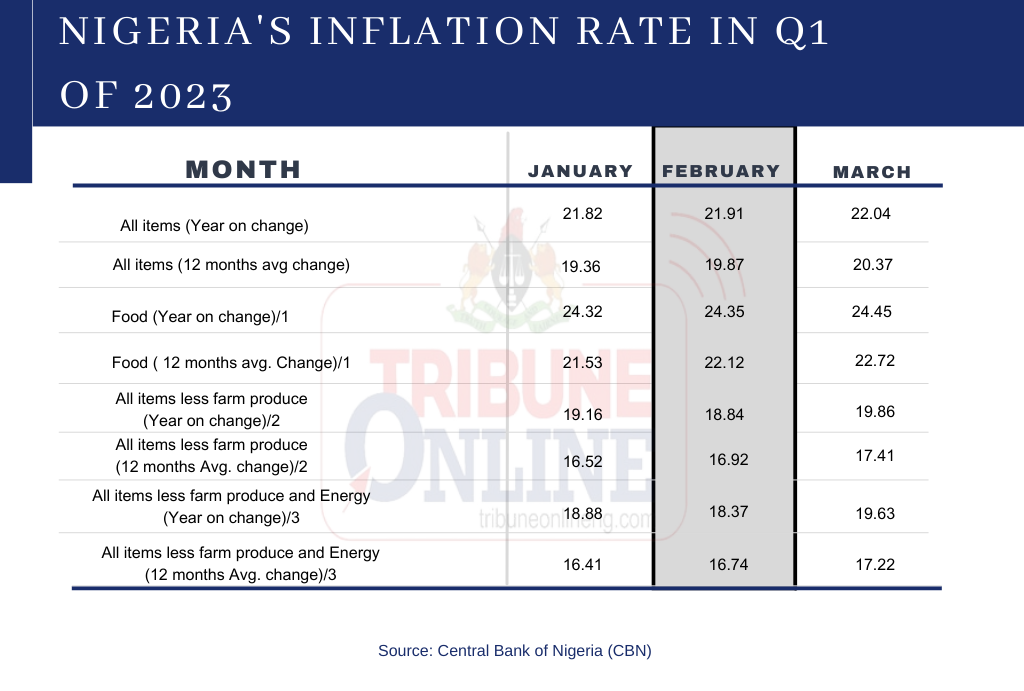

This horrible exponential rise in cost of commodities, hitting harder on commoners – aside from the global inflation situation following the pandemic – tells how Nigeria in the last eight years, failed to jack up production thereby affecting import-to-export ratio to its economic advantage.
Nigeria’s monetary policy – exchange rate and forex availability, interest rate and cash flows – as they affect local production and businesses is another gray area in the country’s call for economic reform. For an administration who met naira at N197 to $1 (US Dollar); leaving it at N460 — and an outrageous parallel market rate of N760 — shows how the country’s currency has lost its value in the last eight years.
Still fresh in the memories is the CBN and Buhari’s last minute naira redesign policy. A self-inflicted hardship Nigeria puts on her citizens. During this five months of cash crunch, currency in circulation dropped from N3.28 trillion in December 2022 to N1.38 trillion in January and to an estimated N982.09 billion in February 2023, representing a 235 per cent decline.
According to data from Trade Economics, Nigeria’s relative imports dependency is mainly; 43% from Asia; 34% from Europe; 15% from America and 7% from Africa. However, Nigeria has a way out of this. But would the incoming government think of partnership with foreign countries and a business-friendly policy to woo foreign investors to Nigeria?
Buhari’s place in Nigeria’s Infrastructure deficit
As a backbone for every economy, infrastructure deficit — road, railway, sea and air ports — dominated developmental talks on the need for the change mantra that eventually brought in President Muhammadu Buhari.
To start with, railway evolution which has resulted in a series of important projects put Buhari’s administration in the limelight as a serious and ambitious government, infrastructure wise. From 156km completed and commissioned Lagos-Ibadan standard gauge rail to 8.7km extension of Lagos-Ibadan rail line, 186km Abuja-Kaduna standard gauge rail (completed and commissioned); and the 327km Itakpe-Warri standard gauge rail which began in 1987 but was completed and inaugurated by Buhari in 2020.
Aside the construction of e-ticketing concession process for both Lagos-Ibadan and Abuja-Kaduna standard gauge rail, construction commenced on Kaduna-Kano standard gauge rail in 2021 while the outgoing President also did groundbreaking of 284km Kano-Maradi standard gauge rail (with branch line to Dutse).
On road construction, Buhari’s administration showed some commitment as some of his big projects include; Lagos-Ibadan Expressway (for completion in May 2023), Second Niger Bridge (for completion in May 2023), Abuja-Kaduna-Zaria-Kano Expressway (two of three sections for completion in May 2023).
According to Buhari’s Minister of Works, Babatunde Raji Fashola, a total of 8,352.94km of roads were constructed or rehabilitated under this administration. His ministry’s compendium tagged; ‘PMB Administration Scorecard 2015-2023 – A Time and Economic Resource Report disclosed that these investments in infrastructure were with a budgetary allocation of N1, 584, 192, 986, 487.24. According to him, N964,840,060,932.12 released while N619,352,925,555.12 are outstanding.
Like railway, Buhari’s investment in Air and sea ports has birthed many projects including Lekki Deep Sea Port and Kaduna Inland Dry Port in 2018 — both completed; construction ongoing at Kano and Katsina Inland Dry Ports while ground breaking of Bonny Deep Sea Port was done in March 2021; among others in Calabar, Port Harcourt and other facilities to aid the sector.
Also, Nigeria’s aviation sector has witnessed some levels of commitment. Abuja international airport was reconstructed in 2017, for the first since it was built in the 1980s. Same as completion of New Terminals for International Airports in Lagos, Abuja, Kano and Port Harcourt. Also, New Runways for the Abuja and Enugu International Airports were completed. These and many others plus infrastructural upgrade of airports nationwide, including aviation agencies like; Nigeria’s Accident Investigation Bureau (AIB) — transforming into a multimodal accident investigation body; Nigerian Safety Investigation Bureau (NSIB) and Nigerian Meteorological Agency (NIMET) were not left out.
A quick peep into former President Goodluck Jonathan’s approved 4.5 trillion budget, already running before President Muhammadu Buhari assumed office in 2015. Despite the country’s infrastructure deficit, only N755 billion made it into capital expenditure that year.
However, Nigeria’s budgets grew exponentially to N6.08 trillion for 2016, N7.29 trillion in 2017, N9.12 trillion in 2018 and N8.92 trillion in 2019.
Despite shortfalls in revenue targets, hinged hugely on oil price performances and taxes, Nigeria’s budgets rose to N10.80 trillion in 2020, N13.60 trillion for the 2021 fiscal year and N21.3 trillion in 2023 — Buhari’s last fiscal year.
Notably, capital expenditure has N6.45 trillion, representing 27% of the 2023 budget. But this has never been a case of ‘the more the merrier’, instead, more borrowing for a country already spending 95 per cent of its revenue on debt servicing. For Tinubu’s government, diversifying Nigeria’s revenue stream and reduction in recurrent expenditure should be prioritised.
In the last eight years, none of these fiscal boosts for capital expenditure had a 100 per cent implementation. It’s always been a roll over. The issue around full implementation is another turbulent area, calling for a robust working relationship between Tinubu’s executive arm and the 10th Assembly.
However, for an administration that met an external debt of $7.35 billion, leaving $41.69 billion (with possible increase) in external debt stock means Nigeria has borrowed more for recurrent expenditure than capital. Like Obasanjo, can Nigeria under Tinubu get a debt pardon again?
Women’s 35 per cent affirmative action under Buhari
In Nigeria, women’s representation in governance is never tantamount to their energy and importance in electioneering processes. For a gender that makes up almost half of the country’s population — 49 per cent — achieving 35 per cent affirmative action as enshrined in the National Gender Policy of 2006 still elusive. From elective to appointment, women’s face in governance still underrepresented.
The policy received a boost under Goodluck Jonathan’s administration when women made up 33 per cent of his 42 cabinet members. However, six made Buhari’s 36-man ministerial list in his first tenure – representing 16 per cent. Out of 43 ministerial appointments the outgoing President made in 2019, seven are women. For gender justice advocates, all eyes on Tinubu for a change in narrative.
What Education looks like for Tinubu’s administration
A report by NIGERIAN TRIBUNE in August 2022, the Federal Government acknowledged that the country’s education system faces significant difficulties but insisted that Nigeria’s spending on education is far in excess of the sector’s recommended budgetary allocation of 26%.
However, 6.7% of the nation’s overall budget of N6.06 trillion, or N369.6 billion, was allocated to public education in 2016. And sparsely boosted since then until 2023, when 8.8 per cent of the total budget goes to education. Ghana — a neighboring country smaller in population and topography compared to Nigeria — on the other hand, spent 23.81 per cent of its national budget on education in 2015, 22.09 per cent in 2016, 20.10 per cent in 2017, and 18.6 per cent in 2018, according to World Bank estimates.
Not only Ghana, Nigeria is bigger than South Africa both in population and economy. However, the country in 2015 — the same Buhari took over — spent 18.70 percent of its total budget on education. 18.05 in 2016, 18.72 in 2017, 18.90 in 2018, 19.60 in 2019, 19.53 in 2020, 18.42 in 2021.
With this, many stakeholders believe the sector’s future would depend on the results of the 2023 presidential election. Like Buhari, would Tinubu appoint another Adamu Adamu who claimed to know nothing about the education sector until his appointment?
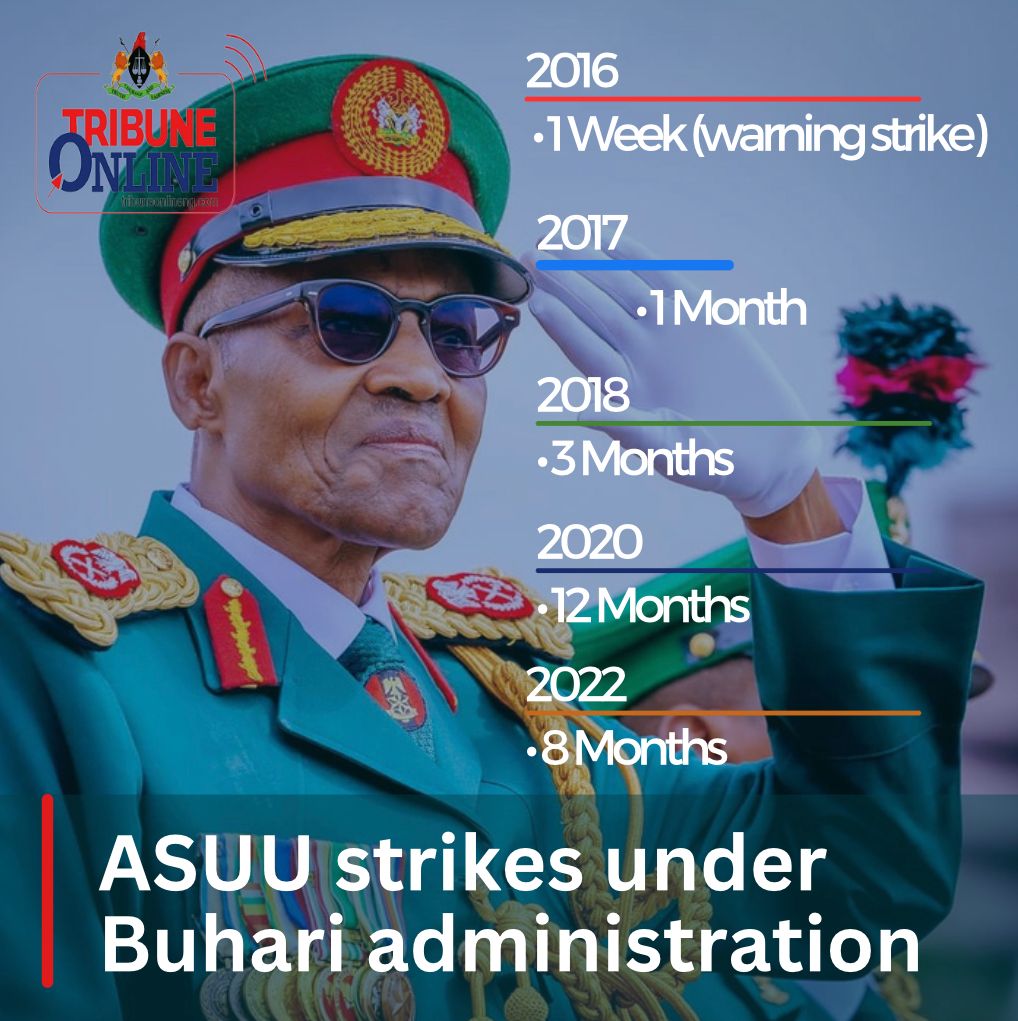
Aside perennial industrial actions continue to cripple Nigeria’s public tertiary institutions — over 600 days of strike actions and longest ever under an administration — brain drain is a significant and exigent problem to look into by any serious government after Buhari’s.
The exodus of middle-class and highly qualified Nigerians becoming more popular lately, has left Nigeria lacking in qualified academics, researchers, and other professions like the aching health sector. The main causes of this “brain drain” or “Japa” in Yoruba — meaning “run or to flee — are principally poor leadership and corruption; then a lack of job security, poor working conditions, poor pay, and few educational options.
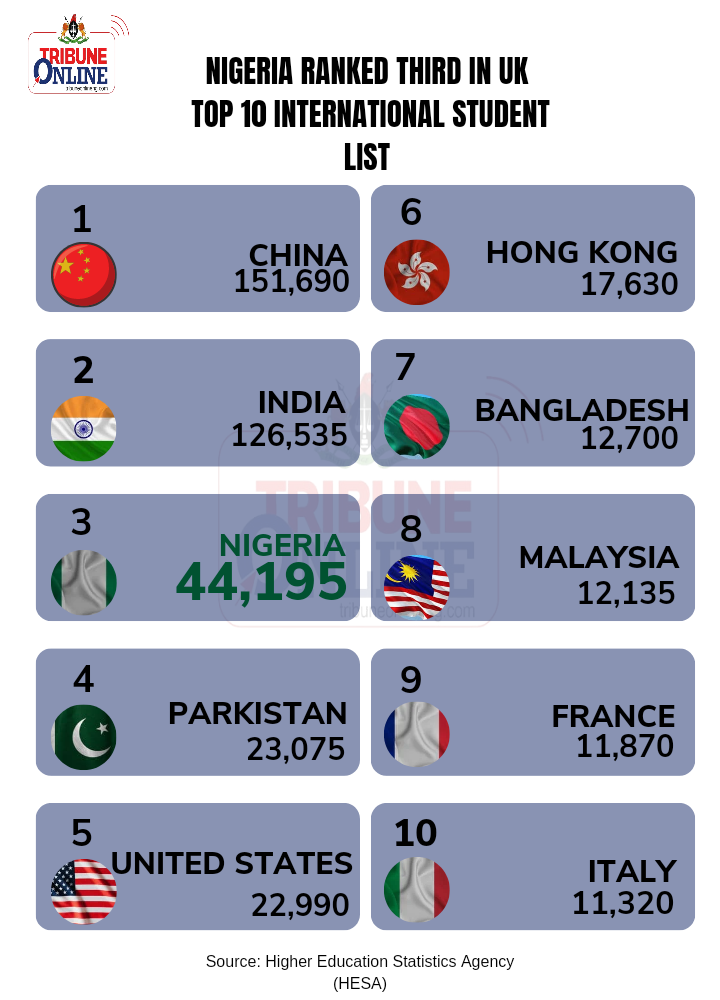
Among other solutions to ASUU’s demands, a quick pick from Wale Babalakin’s report was the proposed alternative funding for education — multiple sources including private sectors. Would Tinubu’s blueprint and choice of education minister be a saviour?
Nigeria’s Insecurity and what next?
Security, they say, is the fabric of every society that must drive across all facets of developmental strides. Nigeria, as the most populous black nation is faced with an avalanche of security challenges which are hitherto evolving day by day on an industrial scale. Such security threats include; terrorism, insurgency, militancy, armed robbery, kidnapping and recent carnage growing haywire regarded as Farmer-herder conflict is at a worrisome level.
Almost every region in Nigeria is in some way affected by ongoing security threats, whether in the form of insurgency in the North East driven by the Islamist terrorist group, Boko Haram, anti-state violence or criminals waging war against citizens with hundreds of thousands deaths recorded hitherto.
Agriculture has been the worst hit with many farmers unable to return to their farms for fear of being confronted by unexploded landmines and the return of militants.
The audacious act that exposed the gaps in Nigeria’s security was the abduction of 200 Chibok schoolgirls by Boko Haram in 2013 which brought the conflict in the North East to the world’s attention. This apparent lack of security was a determining factor in the outcome of the 2015 elections.
Before the elections in 2015, President Buhari, then a presidential candidate, made a bold promise to eradicate Boko Haram by the end of the year 2016, this is 2023 (some days to handing-over), the Boko Haram insurgency has now metamorphosed to Islamic State West Africa Province (ISWAP), and gradually becoming intractable.
According to BusinessDay, rising violence in the country cost Nigeria 11% of its GDP with N119 billion. Similarly, projects worth N12 trillion were abandoned across Nigeria due to insecurity and other challenges according to data from TownTalk Solutions.
Similarly, Terrorism Index in Nigeria averaged 6.99 Points from 2002 until 2021, reaching an all-time high of 9.12 Points in 2015 and a record low of 3.86 Points in 2002. Nigeria Terrorism Index – values, historical data and charts – was last updated on May of 2023, Trading Economics reports.
The table below shows the number of people killed in each of the six geopolitical zones in 2022:

With this spate of ubiquitous security challenges, every Nigerian seemingly anxious of whether a Tinubu’s government will prioritise modernisation of security architectures in terms of training, intelligence sharing, advanced technology, logistics, motivations, changes of orientations and creation of jobs teeming youths whose unemployment rate currently stands at 42.5 per cent, according to NBS data.
